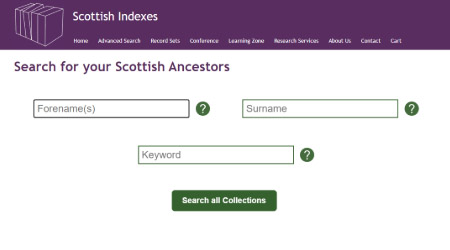Scottish Indexes Help
Search Features - Alternative Surname
Using Wildcards
Historically, the spelling of names was very fluid. There are a few reasons for this. It may have been that our ancestors could not write their name, although many could. A large consideration though is who wrote the name down. Records were often written by officials or a handwritten document was transcribed by an official; they may have tried to ‘fix’ spelling errors or standardise names.
For example, many people called Helen in Scotland are known as Ellen. We will often see both names associated with the same person.
Other names such as Thompson can also be written as Thomson. How can we find all of these variations? Use wildcards.
The wildcard * can represent any series of characters, and the wildcard ? can represent any single character.
Both can be used in any field. Let’s say your ancestor’s surname was Blyth. In Victorian records spellings were very inconsistent, and the surname may have appeared with or without a final ‘e’. To get around this, try a search of Blyth* and this will bring up all Blyths, with or without the final ‘e’.
Perhaps a first name is causing some difficulty, for the same reason. Helen, for example, might be ‘Hellen’, ‘Helen’, ‘Ellen’, ‘Elen’, ‘Elinor’ or ‘Eleanor’. Searching for *el*n* will bring almost all variations of the name up.
Coverage of the indexes
Although our indexes are expanding rapidly we have not indexed every record in Scotland! In fact, there is a very long way to go, which also means there are still many discoveries to make.
If, however, you are not finding who you are looking for, check our coverage pages to see if we have indexed what you need.
Ways to search
We have three ways to search. The basic homepage search is great to try out at first but you will probably see too many results. The Advanced Search and Record Sets both have their uses depending on what/who you are trying to find.
'Advanced Search' is great if you are looking for a specific person. Be careful not to fill in all the options but you can search by name, year of birth and event place etc. If you want to discover if a particular ancestor appears in our indexes this is a good way to search. This option searches all collections simultaneously and provides categorised results.
'Record Sets' allows you to search just one record set at a time. If you are working with a common surname like Scott or Thomson this makes the search results more manageable. By only searching one category you will see fewer results.
Searching by Record Sets is very useful when it comes to the paternity search. Use the dedicated Scottish Paternity Index search page and search by parents' names. If you are looking for a specific entry use the details you have to make the search. It’s also fun to make speculative searches. Most illegitimate children lived with their biological mother or her family. We come across them in the census etc. Try searching by the name of your male ancestors only and see if you find a record of a 'secret' child!
Search Features - Alternative Surname
Using our Advanced Search you can search using two surnames. Health and legal records in Scotland are usually indexed on our website under both a woman's maiden and married surnames. Let's say you are looking for a Margaret Scott whose married surname was Smith. She could be hard to find as there are a lot of Margaret Scotts and Margaret Smiths. By searching for Margaret Scott with the alternative surname of Smith she is much easier to find!
Have a go, but remember, not all records contain both surnames so sometimes we have to wade through a lot of entries to find the one we are looking for.
Search Features - Patient ID
Every time a patient was admitted to a Mental Health hospital they were given the same ID. This patient ID enables us to group records for the same patient together. This is useful for a few reasons.
First of all it speeds up your search as when you find one entry, you can find them all. Sometimes though a patient uses multiple names. For example, Agnes Moir was also known as Georgina Moir. If we searched only using the name Agnes we would see just two results. When we use the patient ID feature, all her records are grouped together.

A third way this can help is when we have an ancestor with a very common name. When a patient dies in the asylum they are easy to identify. For example, John Scott died in Montrose Royal Asylum on 28 May 1868, but was this his only admission? There are so many John Scotts in the index it may be hard to know for sure. Once you identify one entry use the 'Click here to search for any other records for this patient' option, which will group together all the patient records with the same ID. Now you can easily see his other admission.




